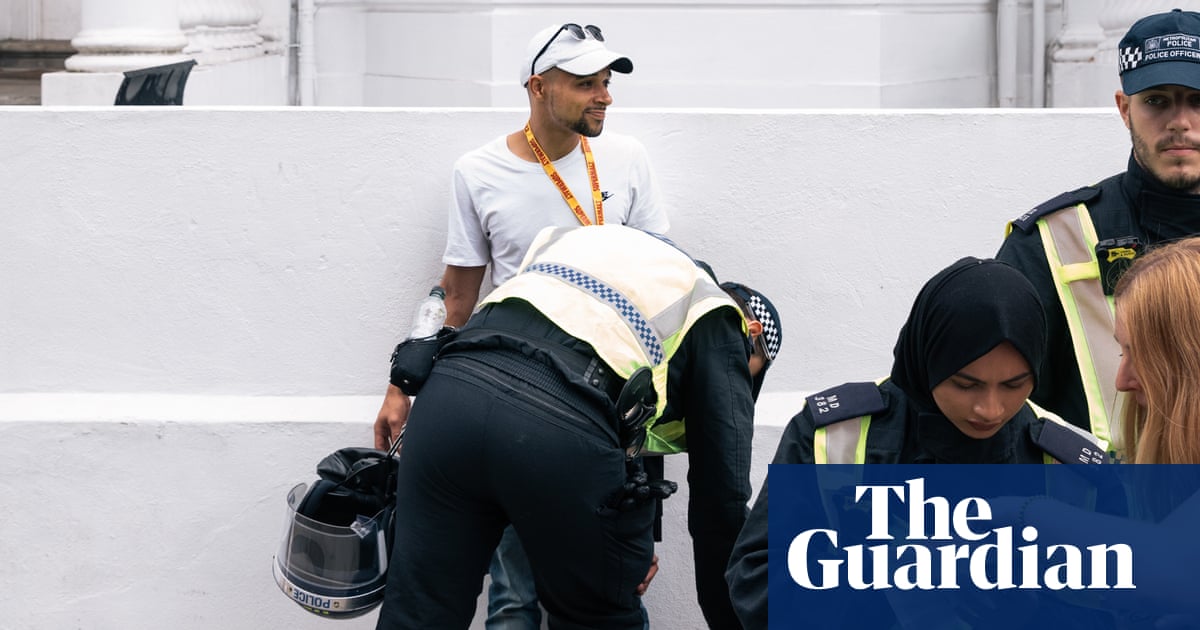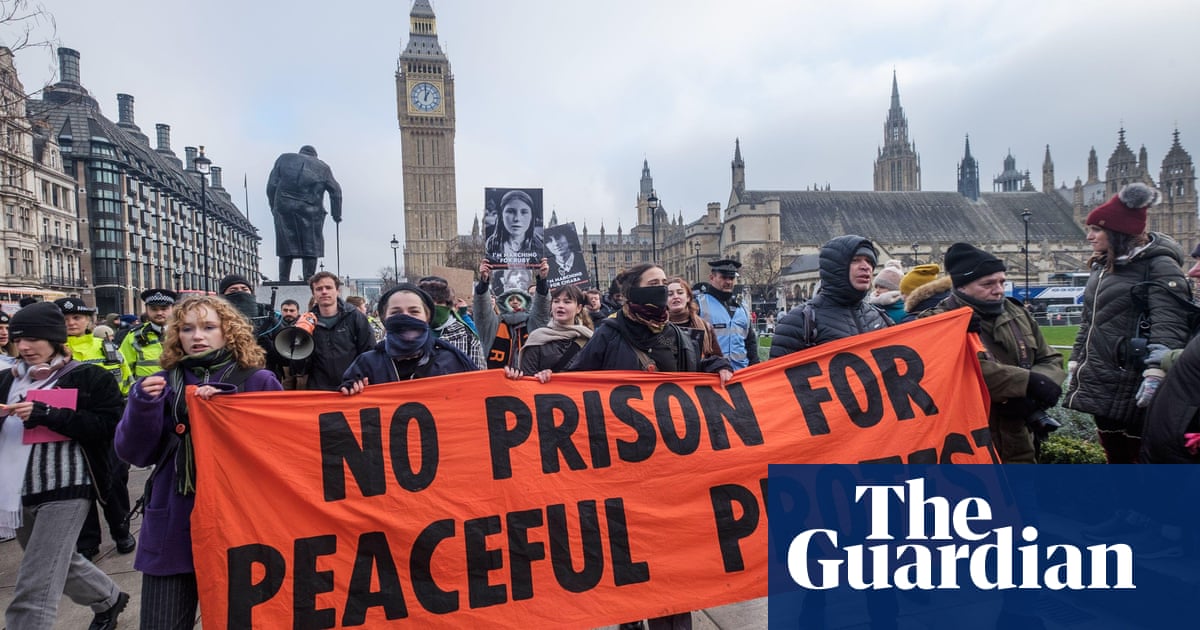
The official policing inspectorate showed repeated bias in favour of the police and against peaceful protesters as it compiled a report which backed a government clampdown, a whistleblower has alleged.
The complainant says a report on protest released in March this year was skewed in favour of the government view, with conclusions reached before evidence was gathered and assessed.
The Guardian has learned that the whistleblower, Alice O’Keeffe, has officially complained to her bosses at Her Majesty’s Inspectorate of Constabulary and Fire and Rescue Services (HMICFRS). She believes the civil service code was breached. HMICFRS said it was assessing her claims.
Her formal written complaint contains allegations that HMICFRS told the home secretary in a private letter it backed the need to change protest laws five months before its report was published.
It is also alleged that some in the inquiry team, which was mainly made up of serving and former police officers, likened peaceful protesters to the IRA, which waged a terrorist campaign against the UK.
O’Keeffe worked on the report on protest as an associate editor. The home secretary, Priti Patel, asked for the inquiry as she pushed for stronger powers.
The 161-page report was published on 11 March.
O’Keeffe’s written complaint was made as HMICFRS worked on a separate report on the policing of a vigil for Sarah Everard. She said the biases she had seen left her fearing a report into the policing of the vigil would be a whitewash.
On Tuesday that report totally exonerated the police and found fault with those who had criticised the force’s manhandling of women at the Clapham Common vigil.
HMICFRS defended itself, saying the complaint was being assessed: “The independence of the inspectorate has always been conspicuous. It is led by Her Majesty’s chief inspector of constabulary, whose reputation for independence goes back many years.”
The complainant worked for HMICFRS on a freelance basis for five years, helping to compile the reports produced by the policing inspectorate.
The whistleblower wrote a complaint to Sir Tom Winsor, the chief inspector of constabulary, on 20 March.
She says early in discussions as the protest report was being worked on, it became clear to her the team had made its mind up.
“The purpose of the report was not to collect evidence and then make a decision, but rather to collect evidence to support the decision that had already been made,” her complaint says.
As evidence for this O’Keeffe cites a letter she helped draft from HMICFRS to the home secretary in November 2020, five months before report was published.
The letter is alleged to have read: “We believe all five proposals would improve police effectiveness … Moreover, measured legislative reform in these respects would send a clear message to protesters and police forces alike about the limits of the right to protest.”
On 7 December, the home secretary replied. According to O’Keeffe, Patel wrote: “Protests have proved a significant challenge over the last year and I am keen to ensure that the police have the powers and capabilities they need to help address the disruption they face. Your findings will help me to do that.”
She says the panel that wrote the report was made up entirely of police officers, apart from herself and two lawyers.
HMICFRS said: “The work on the inspection was in two parts. The first part concerned the legal sufficiency of existing police powers. The fieldwork on that part of the inspection was a legal analysis, which was thorough and carried out by external legal counsel. It was complete by the time the letter to the home secretary was written.
“The part two fieldwork concerted how police powers were being used in protests, and no judgment was made until the end of the part two fieldwork. Indeed, it was made clear to the home secretary that our part one judgment was provisional and would be affected by conclusions reached in part two.”
The inquiry into protests was triggered by government annoyance over Extinction Rebellion (XR) and Black Lives Matter (BLM) protests.
O’Keeffe said activist groups were compared to the violent IRA: “Members of the team repeatedly drew direct comparisons between the IRA and the peaceful direct action protest groups that the report was focusing on.”
HMICFRS issued a flat denial: “There was no equating of peaceful protesters to the IRA.”
The complaint says that after the report was completed, one team member organised a “virtual pint”, to celebrate the benefits of being “alarming and illiberal”, a phrase mocking an activist group’s point of view.
Separate to the whistleblower, the Guardian has been told by a senior figure that early drafts of the protest report were much stronger and were subsequently toned down.
O’Keeffe also alleges in her written complaint that the results of a public opinion survey were cherrypicked to present findings more favourable to supporting a clampdown. Also she says that disruption caused by extreme rightwing groups was ignored, with the focus being on XR and BLM, which are seen as broadly of the left. Patel had said BLM was “dreadful”, with its protests last year during lockdown attracting over 250,000 people, according to police estimates.
O’Keeffe says the team of 12 contained one minority ethnic member. She has also sent her complaint to the Civil Service Commission, and, because of the human rights issues involved, to Index on Censorship.
O’Keeffe, who has worked across the media, was until 2016 an editor at the Guardian and still contributes occasional pieces for Guardian News and Media. She says she enjoyed working at the policing inspectorate.
HMICFRS added: “Following the recent protest inspection, Ms O’Keeffe, one of our associate editors, made a number of observations which are being evaluated. As an editor, she was not privy to all the work which assessed and weighed the evidence in the inspection. The final judgment was made by one of the inspectors of constabulary, and approved by the board of the inspectorate.”
O’Keeffe was due to work on the Everard vigil report, but after raising concerns and criticising the Met’s actions to colleagues, was removed from the team. She has no complaint about that decision.
HMICFRS said: “The Clapham inspection was entirely objective as is apparent from the report just published. Ms O’Keeffe was not put on the Clapham report because, by her own acknowledgement, she had already made up her mind what the conclusions should be before any evidence had been obtained.”
HMICFRS also said people working for it were entitled to complain and policies said they should suffer no detriment. “The policy is clear – no person must suffer any detriment as a result of raising concerns under this policy. This has been made clear to the person reporting in this case.
“The concerns raised are still being considered and, as such, no substantive response has yet been provided.”












